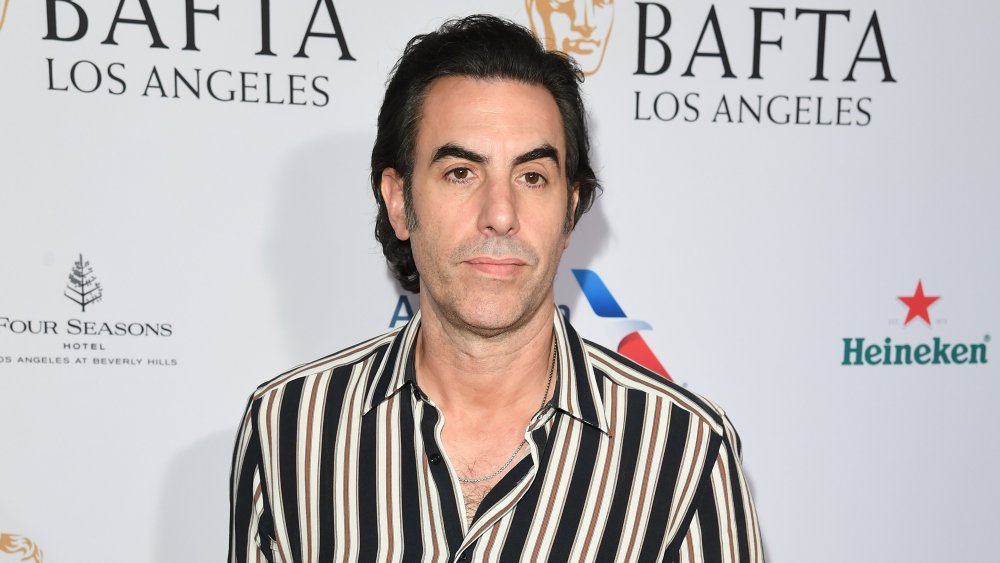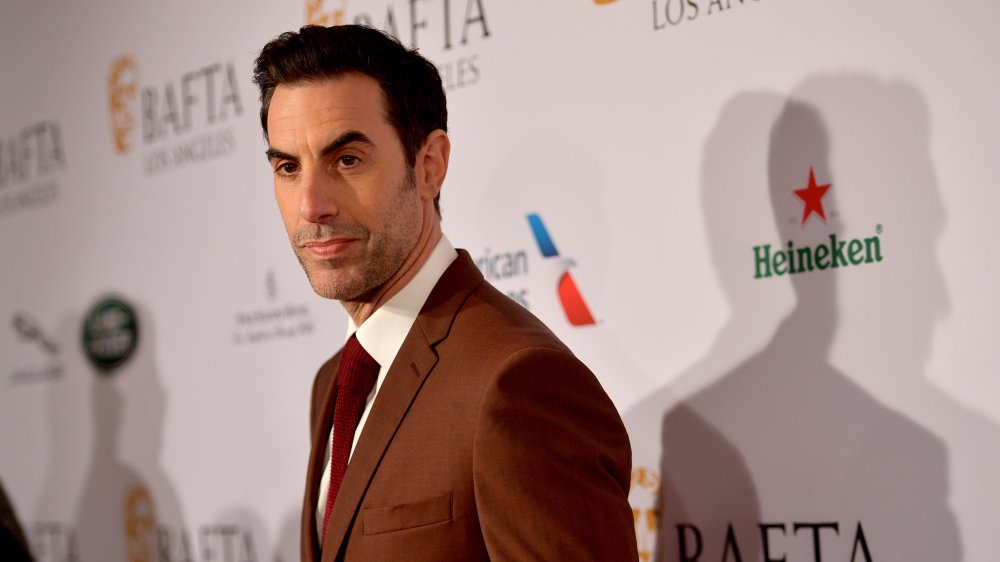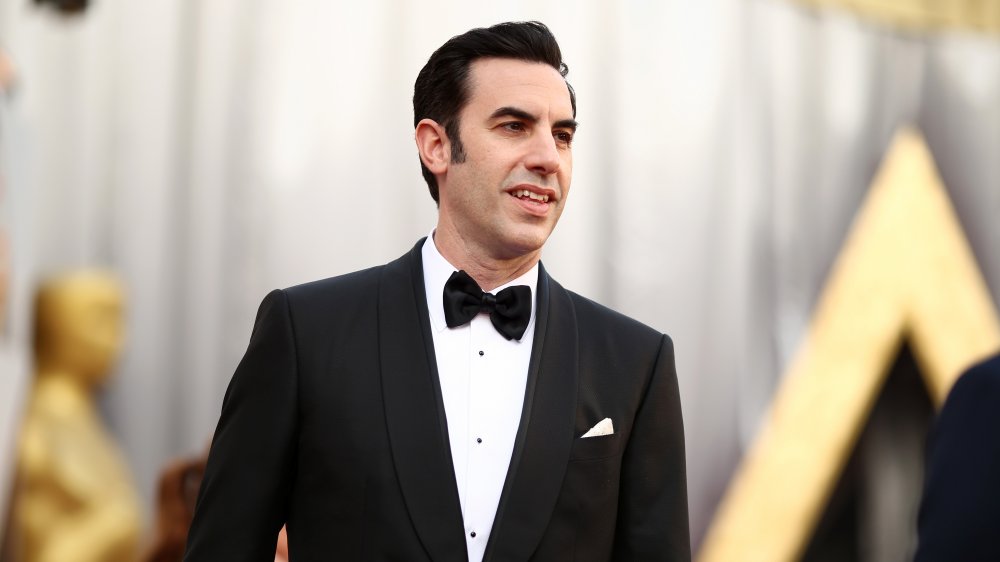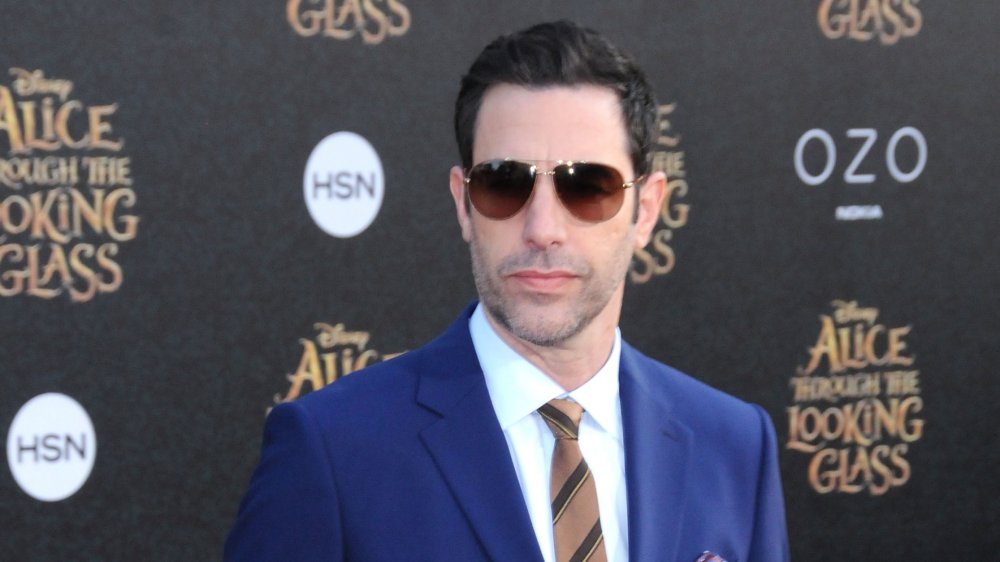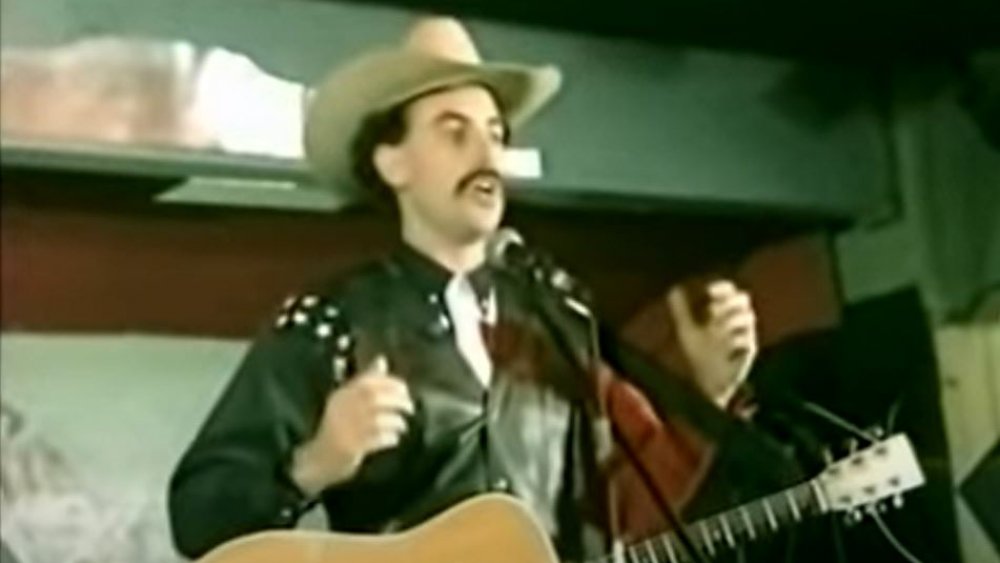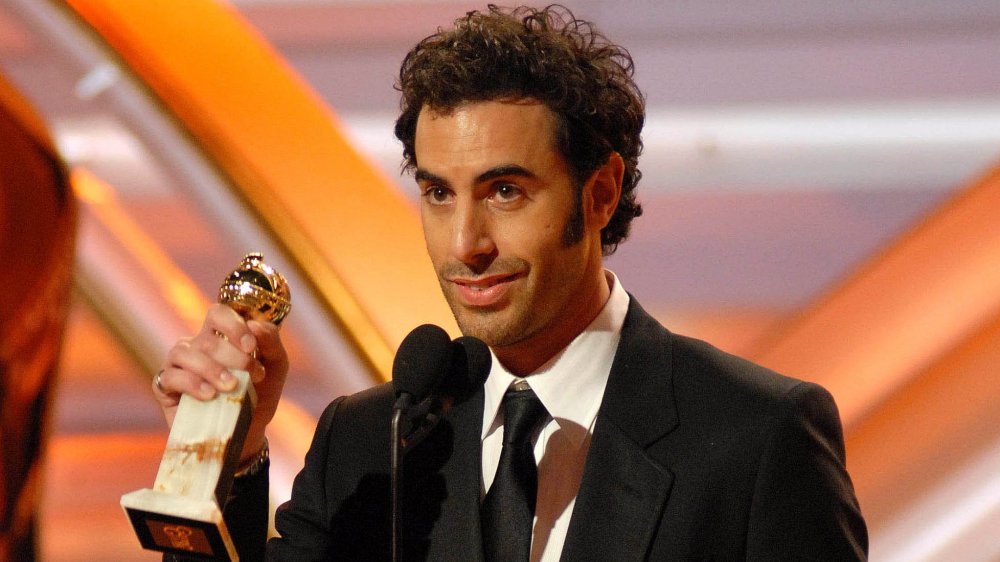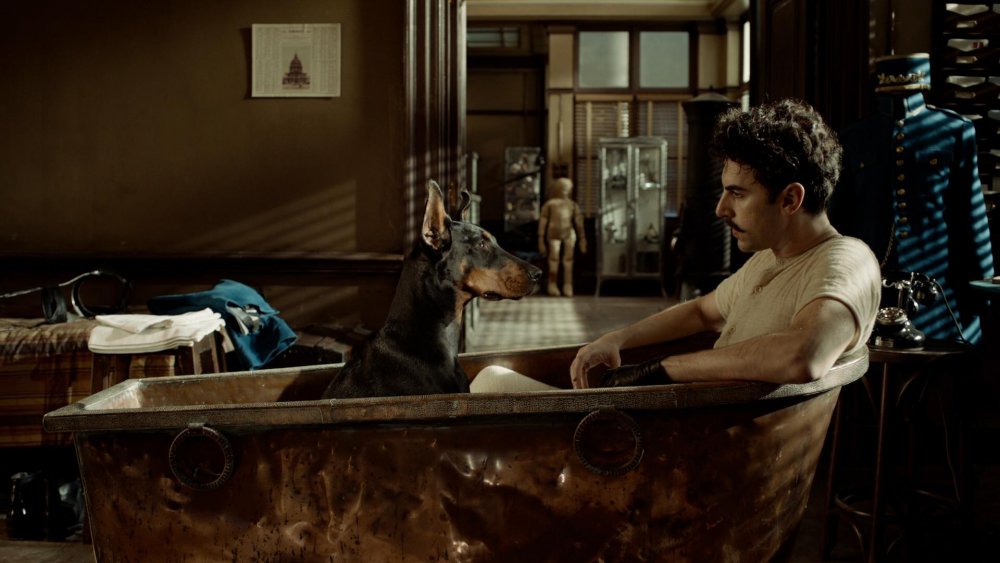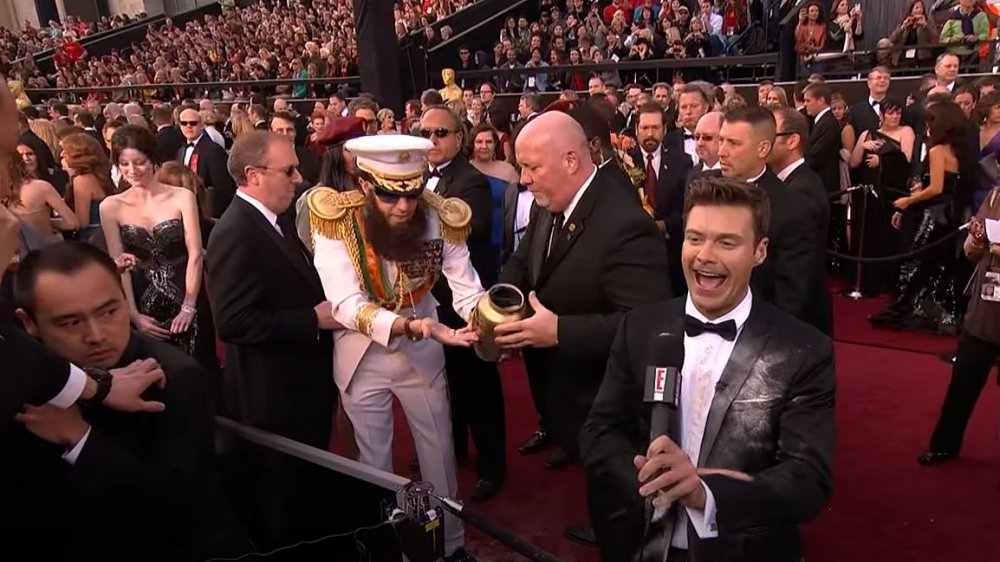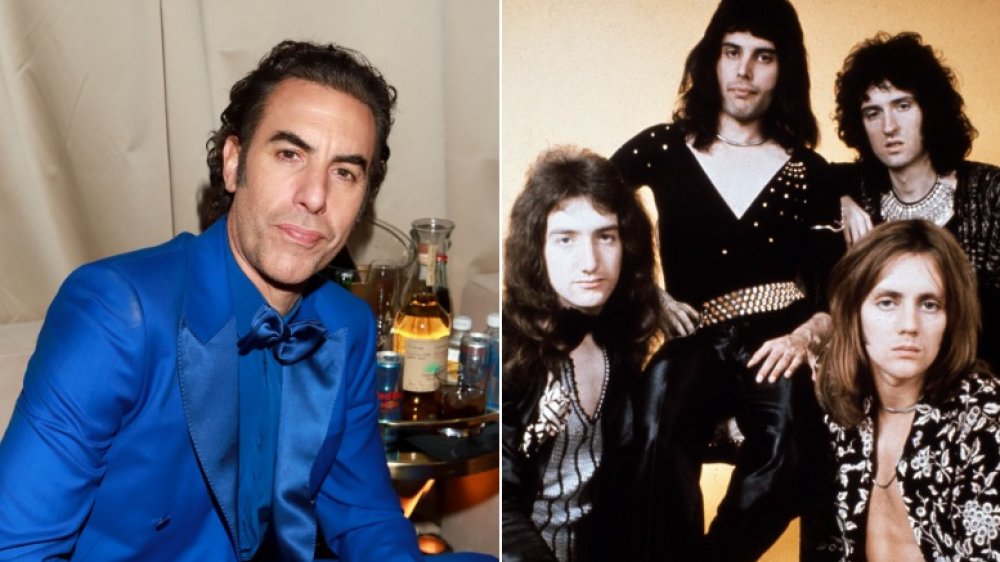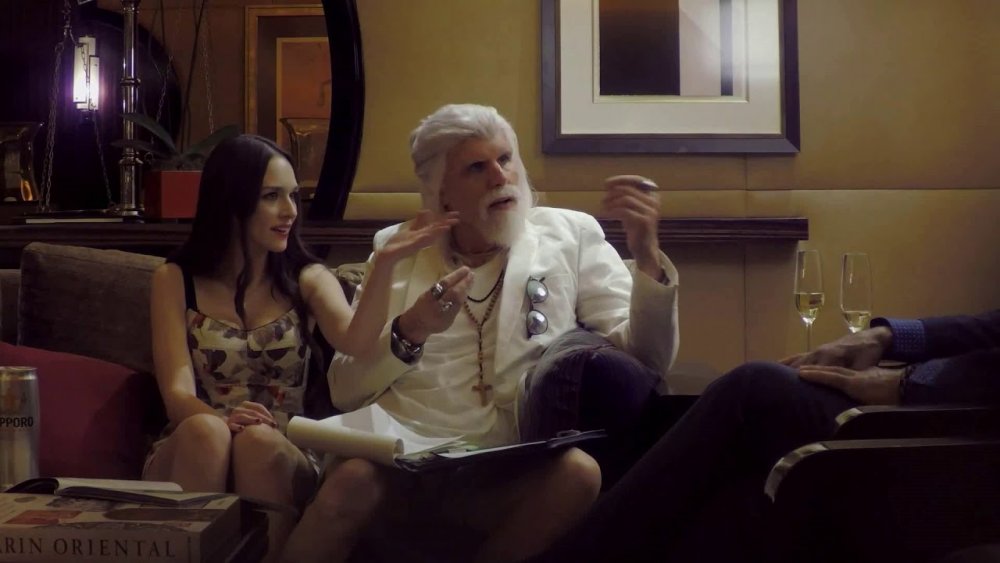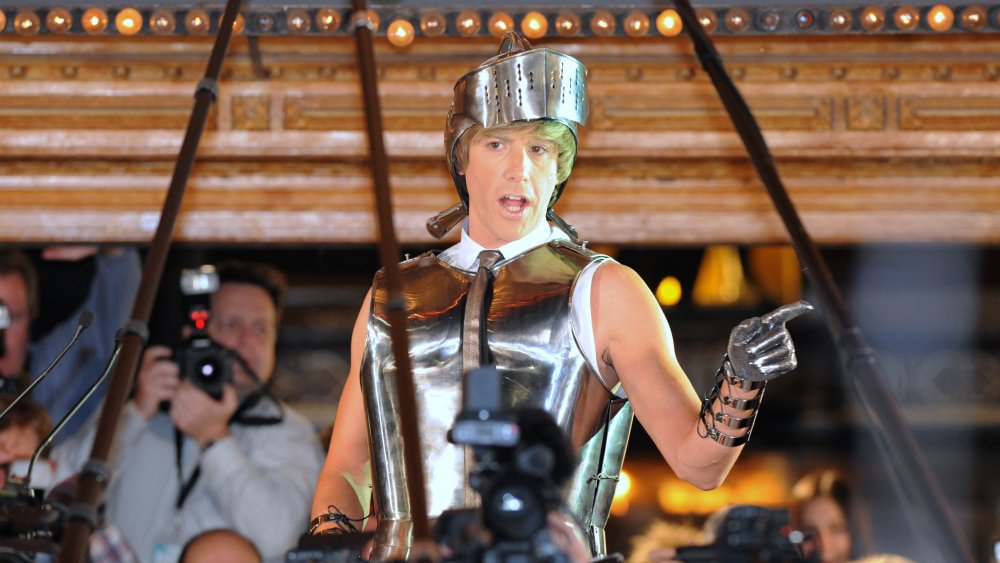The Untold Truth Of Sacha Baron Cohen
Sacha Baron Cohen's characters are world famous. It's a small wonder he was able to make a sequel to Borat after 2006, given that the most annoying people you know are still using his catchphrases. In fairness, he's done much more than Borat — he's been in everything from comedies to musicals to dramas, showing that he's one of the most versatile actors working today. He's also one of the busiest, even if his filmography seems to have gaps — it's just because he puts so much care into each role. Borat Subsequent Moviefilm and The Trial of the Chicago 7 were released within days of each other.
Even so, not much is known about Sacha Baron Cohen, the man. He only recently started giving out-of-character interviews and making his views more well known. As such, there's still a lot of mystery to Cohen, and much many casual viewers wouldn't know. Here's a look at some of the most interesting (and often least known) bits and pieces about Baron Cohen's life.
His origins as a performer
Sacha Baron Cohen wanted to be a performer since childhood. His favorite actor and number one influence growing up was Peter Sellers. "He was this incredibly realistic actor," Baron Cohen told The Guardian, "who was also hilarious and who managed to bridge the gap between comedy and satire." It's an easy influence to understand: Sellers, who claimed he had no personality outside his characters, wouldn't just act his roles, he'd become them.
Baron Cohen formed a breakdancing troupe at age 12, specifically so they could perform at his bar mitzvah. He was a member of Jewish Socialist-Zionist youth group Habonim Dror during his teenage years, writing and performing many sketches, including one with his brothers: "The Schvitzing Brothers." Baron Cohen described the sketch on WTF with Marc Maron as being "about how these Hasidic Jews get so hot that they end up shaving their beards and taking their clothes off and actually converting to Christianity at the end. And it would go down terribly. I mean these old-age homes would hate it."
In college, Baron Cohen joined Footlights, Cambridge University's theater club. After college, he gave himself five years to "make it" as a performer. He spent some time working for small TV stations, where he developed a character who'd later become Ali G.
He comes from a talented family
Several of Sacha's siblings and cousins are also accomplished. Some work behind the scenes; others are world famous in different fields. His grandmother Liesel Weiser was a fitness instructor for over 70 years who taught until she was almost 100.
Sacha's older brother Erran is a composer. Erran has an extensive career, but he's best known for working with his brother — he provided music for Da Ali G Show, Borat, Brüno, The Dictator, The Brothers Grimsby, Who Is America?, and Borat Subsequent Moviefilm. Erran is also the only person attached to Borat who ended up having a good relationship with Kazakhstan: he was asked by the Turan Alem Kazakhstan Philharmonic Orchestra to write a new Kazakh-influneced classical music set. Their brother Ammon is a computer chip designer.
His cousins are also accomplished. Ash Baron Cohen has been directing low-budget films since the '90s, but has a knack for talent — he convinced Richard Harris to leave the set of Clint Eastwood's Unforgiven for a day to do a cameo in a student film. Dan Baron Cohen is a Brazil-based playwright and arts educator who often works with indigenous or landless people on many causes. Simon Baron-Cohen is a cognitive neuroscientist and one of the world's foremost autism researchers, best known for the mind-blindness theory of autism and runs the Autism Research Centre at the University of Cambridge.
His Jewish roots go deep
While he doesn't count himself as particularly religious, Sacha Baron Cohen's Jewish identity is a large part of his limited public persona. He keeps Shabbat when he can, not working Friday evening through Saturday evening, and attends synagogue a few times a year. He also keeps kosher whenever possible, once grilling a waiter about an appetizer during a Rolling Stone interview to make sure there was no shellfish or pork.
His Jewish identity goes beyond traditional observances. Baron Cohen worked at a kibbutz in northern Israel during a gap year before university. He wrote his undergraduate thesis on the alliance between Black groups and Jewish people during the civil rights movement, traveling America and using the ADL's archives to complete his research. He also speaks fluent Hebrew, the language he actually uses when playing Borat. Yes, that's right — a famously antisemitic character is speaking Hebrew.
How he sees his characters, as demonstrated by That Song
Borat isn't just a funny character — Baron Cohen sees him as a means to an end. He's not just showing that people have intolerant views — he's showing that many are indifferent, a far more dangerous trait. This is best illustrated by Da Ali G Show's most infamous segment: Borat singing country/western song "In My Country There Is Problem (Throw the Jews Down the Well)" at a bar in Tucson, Arizona. By the end of the song, most of the bar is clapping and cheering.
Baron Cohen told Rolling Stone that "Borat essentially works as a tool. By himself being anti-Semitic, he lets people lower their guard and expose their own prejudice, whether it's anti-Semitism or an acceptance of anti-Semitism." He recognized that the sketch was controversial, but that helped prove his point: "To me it revealed something about that bar in Tucson. And the question is: Did it reveal that they were anti-Semitic? Perhaps. But maybe it just revealed that they were indifferent to anti-Semitism."
This assertion was reinforced when the Forward reached out to the Country West manager and were told "The only thing we were told was that he was from Kaka-kaka-stan or something." A bar supervisor told Tucson Weekly that she wasn't worried: "You see worse things on TV, and there are bigger issues to address."
Golden Globe
It's easy to divide Sacha Baron Cohen's career into pre-Borat and post-Borat, but that misses a more specific milestone. By his own estimation, winning the Golden Globe for Borat was the moment his career changed.
Baron Cohen was given the award over heavy hitters and established actors like Johnny Depp and Aaron Eckhardt. He then spent almost his entire speech talking about the movie's infamous naked fight scene, likely the only time the phrase "anus and testicles" were said at the Golden Globes. But even though he made a joke out of the victory, for him, it was no joke.
Baron Cohen told the Toronto Star that winning "broke me out from being just a pure comedian into something larger, because in the entertainment business, people are categorized either as comedians or actors." The award was proof positive that there was a performance behind Borat, furthering noting that "when I used to do Ali G and Borat, people assumed that I was them and there was no acting involved." It helped spearhead a serious acting career that saw him work with Martin Scorsese and Tim Burton not long after donning the grey suit.
What it's like working with Martin Scorsese
One of the first real prestigious roles Baron Cohen took on post-Borat was Inspector Gustave in Martin Scorsese's Hugo. After working largely in comedy, Baron Cohen didn't know what to expect. "I expected him to be an auteur," Baron Cohen told the Georgia Straight, "and he is, but I think that part of his power and the reason why his films are so successful is that he is ready to collaborate fully with his actors."
The two men worked together on fleshing out Gustav. The script originally just mentioned that Gustav had a fixation with catching children and sending them to the orphanage. Baron Cohen wanted to find a motive for these actions, and pitched that he might be a war veteran. He and Scorsese eventually landed on Gustav being an orphan himself and wanting to impose the only structure he knew on others.
Baron Cohen pitched several scenes himself, including the one when his character takes a bath with a dog. "He was totally ready to try out any idea, however ludicrous the suggestion, which was worrying to the producers." He also suggested a scene when Hugo gets caught in the train, which might have turned into the train crash scene. "The scene was like sketch comedy, except you have 500 extras and award-winning designers and producers and actors. But it was a lot of fun for me."
Ryan Seacrest wasn't the original target of his urn-spilling prank
Sacha Baron Cohen attended the 2012 Oscars red carpet in character as Admiral General Aladeen to promote The Dictator. He carried around an urn that he claimed contained the ashes of Kim Jong-il. In a moment that made headlines around the world, he then spilled the ashes on Ryan Seacrest during an interview before being escorted away.
What's less known about that moment: Seacrest wasn't the original target.
Seacrest gave more insight into the incident (via E!) on his radio show on May 7 of that year. Seacrest was backstage at Saturday Night Live the night prior and ran into Baron Cohen's wife, Isla Fisher. She said "I apologize for my husband." It turns out she was there because Baron Cohen was doing a walk-on cameo as Aladeen for a Weekend Update segment. As soon as the segment was over, Baron Cohen ran over to Seacrest and broke character to apologize.
"Originally he said that they were going to spill whatever it was in that urn on George Clooney. Someone decided that wasn't a great idea because he was up for a lot of nominations, it was a big night that night," Seacrest explained. "Then they somehow spun the wheel of tragedy and landed on my name." Certainly understandable, but it's a mild surprise that a legendary prankster like Clooney would ever get a pass.
Why he never played Freddie Mercury
Rami Malek's Oscar-winning turn as Freddie Mercury has led many to forget that Sacha Baron Cohen was attached to star in a Queen biopic for years. Between Baron Cohen's ability to get lost in a role and Borat's Mercury-esque mustache, the casting almost made too much sense. He signed on around 2010 and departed in 2013 after he and the surviving members of Queen couldn't agree on the movie's direction. Band members suggested (via the Guardian) that Baron Cohen was either too recognizable or they had worries the movie would become a joke. Three years later, both sides aired more specific grievances in detail publicly.
During an interview with Howard Stern in March of 2016, Baron Cohen claimed that an unnamed member of Queen said Freddie would die halfway through the movie. The second half would be "see[ing] how the band carries on from strength to strength." Baron Cohen replied "not one person is going to see a movie where the lead character dies from AIDS and then you see how the band carries on." Freddie, in his estimation, had too many amazing and often obscene stories to die off mid-movie, but Queen "wanted to protect their legacy as a band."
Brian May responded via an interview with The Mail on Sunday a month later. He accused Baron Cohen of lying to the press, denying that they wanted to "sugar coat" the band's history. "We decided he wasn't right for the role for very good reasons, which will become apparent if you watch what he's done recently," May said — likely referencing then-recent box office bomb The Brothers Grimsby.
He once turned over footage to the FBI
No character in Who Is America? was darker than Gio Monaldo. A billionaire playboy who dove into the most vile parts of society, he wasn't as blunt as the other characters but he managed to get a lot of awful people to agree to awful things. Baron Cohen revealed to Deadline, however, that there was one interview that went too far even for him.
Baron Cohen wanted to find out how guys like Harvey Weinstein got away with criminal behavior. As such, Gio interviewed a Las Vegas concierge — one who claimed he worked for billionaires and politicians. During the interview, Gio implied he molested an eight-year-old boy and fully expected the concierge to walk out then and there. Instead, he stayed and offered to put Gio in touch with a lawyer that could silence the boy. The interview ended darker still: Gio asked for a "date" to be arranged with a boy aged nine to 12, and the concierge said he had a contact who could arrange it.
The production team immediately handed the footage over to the FBI, given that they might have just uncovered a pedophile ring in Las Vegas. The FBI decided not to follow up on it, but Baron Cohen had seen more than enough and decided not to include it. "It was too dark and wrong," he said. "In a journalistic way it was fascinating, but it was so extreme and so dark that it was too unsettling for the audience."
He's often sued, but only one had merit
Sacha Baron Cohen often gets sued over his work. The suits almost never succeed. Anyone interviewed by Baron Cohen — famous or layman — sign legal releases that prevent them from bringing claims against the producers. Even if the interview itself is deceptive, the target has ample opportunity to review the release. Public figures have even more of an uphill battle — the burden of proof for defamation is much higher for the already famous, and famous people can't exactly defame themselves.
Even lawsuits for fraud are likely to backfire. As entertainment lawyer John Rosenberg told the New York Times, "If I come on to a television show believing that it's a serious, political, issues-oriented format instead of this sort of satirical presentation, and I make a racist or misogynistic comment, Sacha Baron Cohen didn't defraud me into making that statement."
There was, however, one case when Baron Cohen's camp was in the wrong.
In Brüno, the title character interviews Ayman Abu Aita, a Palesitinian man labeled as a leader of militia group al-Aqsa Martyrs' Brigades. This was a lie: Abu Aita is a Christian Palestinian, a grocer by trade, a non-violent activist by choice, and has no association with any paramilitary groups. Abu Aita sued seeking damages, and unlike everyone else had a case: Brüno never used Abu Aita's own words against him and labeled him incorrectly without his consent. The suit was later settled "to the mutual satisfaction" of all parties.
He's outspoken against The Silicon Six
Sacha Baron Cohen introduced Jojo Rabbit at the 2020 Golden Globes by saying "The hero of this next movie is a naive misguided child who spreads Nazi propaganda and only has imaginary friends. His name is Mark Zuckerberg." After some shocked laughs, he joked that was the leftover intro to The Social Network. This made headlines, but is only the tip of the iceberg with regard to Baron Cohen's battle against social media and its complicity in spreading fake information.
Baron Cohen has long called for greater government regulation of social media. The most prominent example of this was his acceptance speech after being given the ADL's International Leadership Award in November of 2019. He spoke for 20 minutes about the dangerous indifference of Facebook, Google, Alphabet, YouTube, and Twitter — the owners of whom he named the Silicon Six. He broke down in detail how just a handful of companies, which he called "the greatest propaganda machine in history," refused to "fundamentally change because their entire business model relies on generating more engagement, and nothing generates more engagement than lies, fear and outrage."
Baron Cohen saved most of his ire for Zuckerberg, who'd spoken out against regulation of social media the previous month and said that while he found Holocaust denial disgusting he wouldn't remove it from Facebook because people get things wrong.. "It's like we're living in the Roman Empire, and Mark Zuckerberg is Caesar. At least that would explain his haircut." Baron Cohen was so serious about this that he later got the speech published in the Washington Post.
Close calls
Sacha Baron Cohen makes much of his living by irritating people, which means that he's put in a lot of dangerous situations. One time he (via The Jerusalem Post) "was booed by 90,000 drunken men at the Alabama-Mississippi football game" while playing Brüno and "got out alive... by switching clothes with the sound man." The MMA scene at the end of Brüno saw a crowd (some of whom had swastika tattoos) yell slurs and throw chairs at him, and he only survived by going through a trap door.
The rodeo scene in Borat was even more hostile than depicted in the film. A contemporaneous report from The Roanoke Times claims that the booing was so loud that front office staff could hear it. One witness said that "If he had been out there a minute longer, I think somebody would have shot him." The rodeo producer realized it was a hoax, so he escorted everyone out and advised them to leave before a riot started.
A setup in Who Is America? saw Baron Cohen pitch "the largest mosque outside the middle east" to a racist crowd in Kingman, Arizona. Baron Cohen, during an interview on Jimmy Kimmel Live, outlined three precautions: audiences had to check weapons, a bodyguard was onsite, and Baron Cohen himself was given a bulletproof clipboard.
The production of Borat Subsequent Moviefilm was his most dangerous yet, and not just because of the pandemic. He wrote in Time that he wore a bulletproof vest while performing at the Three Percenter Rally. He rushed to his getaway car after organizers stormed the stage, only to have his car surrounded and the door pulled open before he escaped.
